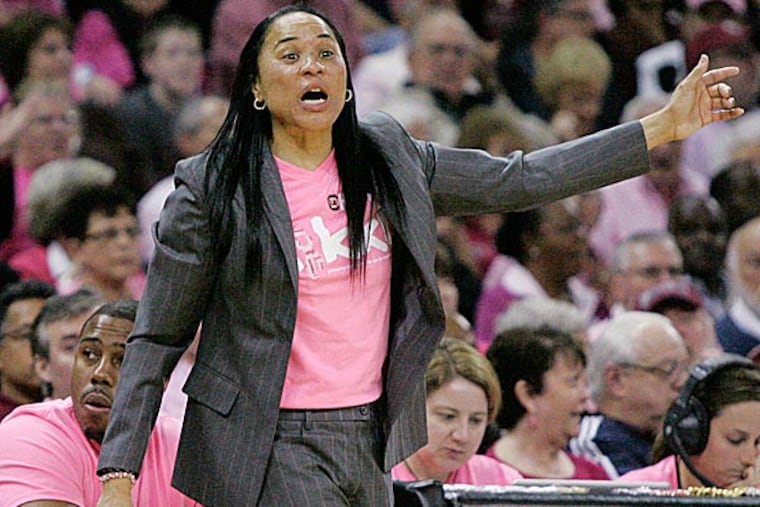Dawn Staley recalls the persistent Dave O'Brien
Dawn Staley kept saying no. In fact, Staley said, she had never given much thought to coaching before Temple athletic director Dave O'Brien reached out to her in 2000 through a mutual friend.

Dawn Staley kept saying no.
In fact, Staley said, she had never given much thought to coaching before Temple athletic director Dave O'Brien reached out to her in 2000 through a mutual friend.
At the time, Staley, Philadelphia's women's basketball icon, was still active in the WNBA, and destined to be the point guard in that year's Sydney Olympics.
Since Staley was in town for that year's Final Four, O'Brien asked if she would mind coming over to campus for a talk.
"I just felt like I needed to go speak with him and tell him no face-to-face," Staley said Tuesday afternoon.
Staley said all this over the phone, returning a message as soon as she got it. She had heard that Dave O'Brien had died Saturday at age 57 after a long battle with cancer.
In Staley's life, O'Brien had been the guy who wouldn't take no for her answer, which changed everything.
"It was really a casual conversation," Staley said of going to Temple to see him. "What was I planning to do in five years, in 10 years? I was pretty honest; I envisioned myself playing."
O'Brien had been an attorney before getting into athletic administration. He knew how to turn a conversation into a friendly interrogation.
"He questioned my leadership skills," Staley said, recalling that she told him it takes some leadership to manage a basketball team on the floor as the point guard.
"He asked me to walk down the hall with him, to meet some other people," Staley said. "All this time, I didn't think it was an interview. I wasn't dressed appropriately. It was just professional courtesy."
So Staley and O'Brien walked in a conference room at Temple, "and there were 12 or 15 people in the room, the whole search committee [for the job]. I sat at the head of the table, fielding all these questions."
She kept giving the same answers: "I don't see myself coaching. I didn't want to coach a day in my life."
Yet Staley emerged, soon after that meeting, with a job offer from Temple.
"I don't know how they got that from the answers I was giving," Staley said.
After leaving O'Brien, Staley found herself surprised to realize that her no answer suddenly wasn't so firm in her own mind.
"I started thinking about Dave O'Brien and his challenges," Staley said. "He challenged me to turn the program around. He was almost questioning whether I could or not. I don't know if that was the lawyer part of him."
As you may recall, Staley took the job. O'Brien let her continue playing in the WNBA, since it was in the summer. She didn't retire as a player until 2006, still a WNBA all-star that season.
The Olympics? What great publicity for Temple to have its coach at point guard for the USA, in 2000 and again in 2004.
What wasn't yet known proved to be true: Staley has equaled her playing prowess as a coach. This was no PR stunt. Temple reached the NCAA tournament six times in Staley's eight seasons as coach.
In 2008, Staley moved on to the University of South Carolina. Her 26-3 Gamecocks are ranked fifth in the country. This week, she was named Southeastern Conference coach of the year. Don't be surprised if she picks up some national coach of the year hardware, or if she one day coaches the U.S. Olympic team.
When Staley was inducted last year into the Naismith Memorial Basketball Hall of Fame, she thanked O'Brien twice in her speech. Her hire may have been the signature O'Brien move, out of the box but brimming with logic.
Every athletic director who has ever worked at Temple could tell you it's a tough job. When Temple's athletic priorities started to turn, O'Brien moved on to Northeastern before returning to Philly, to academia, becoming program manager as well as teaching in Drexel's sports management program, which he kind of brought to life.
He wasn't fazed by much. The night the Liacouras Center opened in 1997, everything was going great until right before the game when the scoreboard right over the court somehow caught fire. Flames were coming out of the bottom.
What did the AD have to say as he watched it?
"Hey, we've got a hot building," O'Brien said.
In recent years, O'Brien was unwilling to let cancer change his attitude. "I'm still throwing haymakers," he'd tell friends, then ask them what they were doing, how he could help them. What sort of job would their skill-set qualify them for? O'Brien was still thinking of things like that as he went into hospice. (A friend of his showed me a recent text to prove it.)
He could spot trends, and if something worked, he'd double down on it.
When O'Brien took the AD job at Northeastern in 2002, he called Staley again.
"He asked me if I had some interest in the men's job," Staley said.